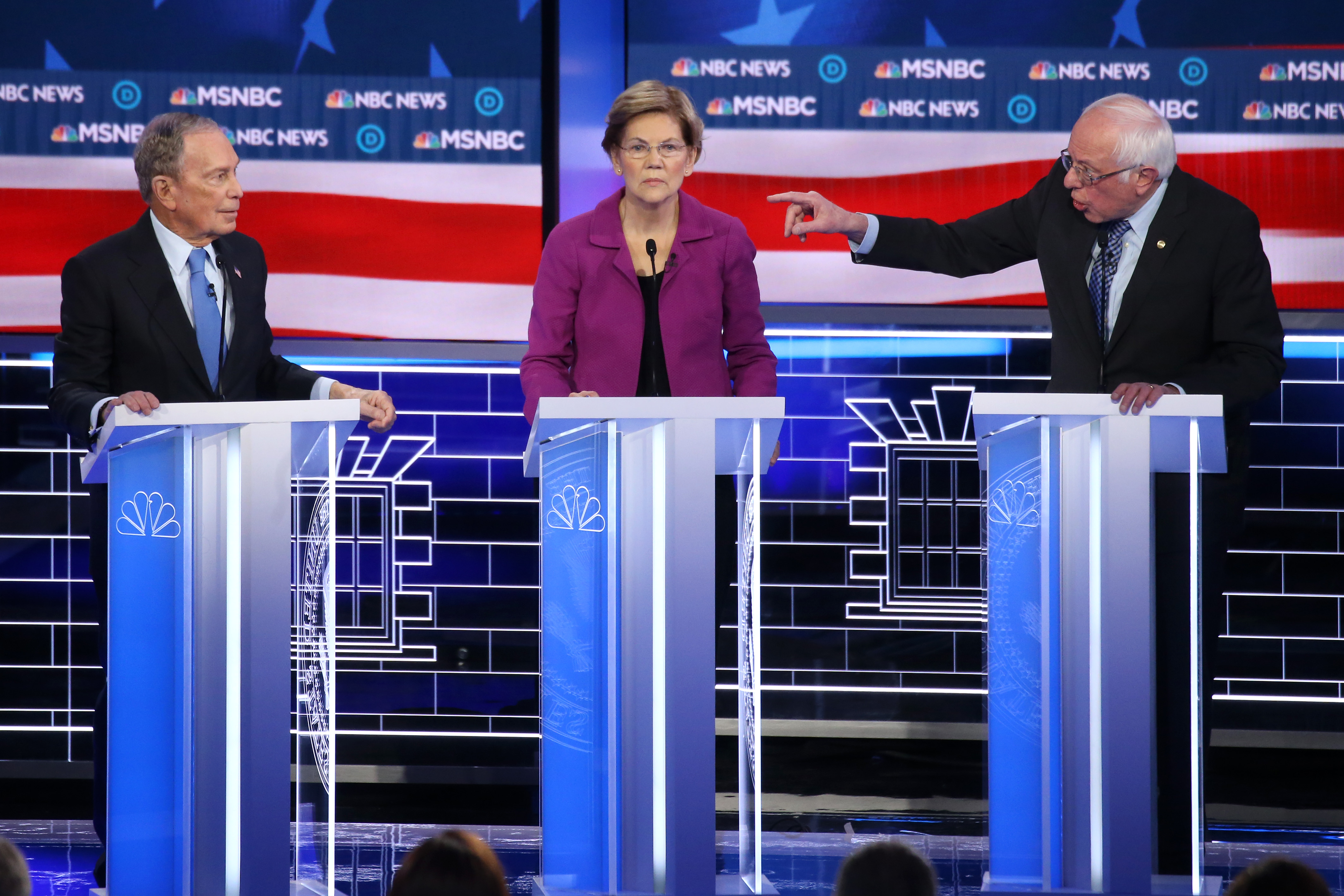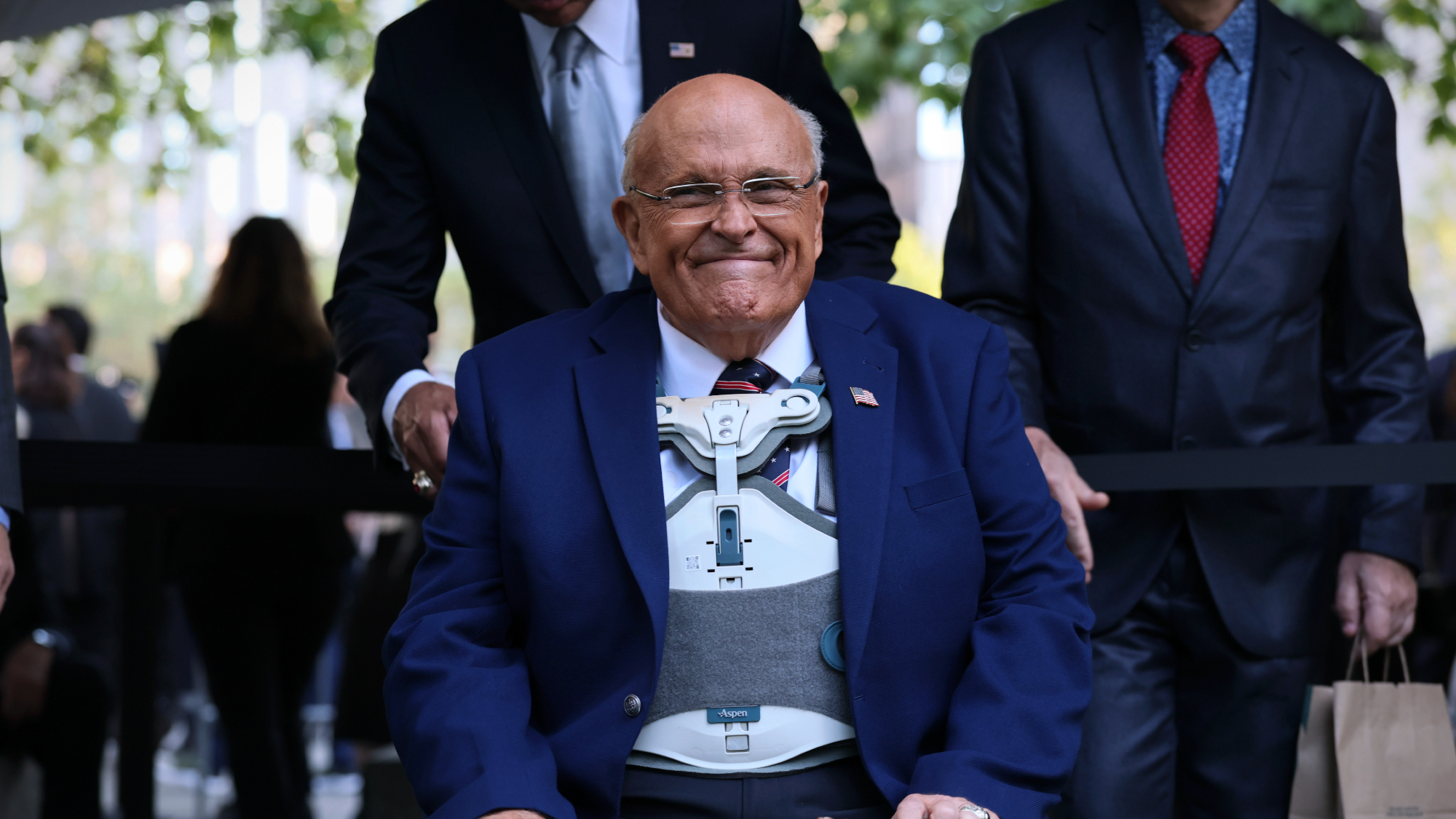US election 2020: How can Michael Bloomberg enter the presidential race so late?
Bloomberg short-circuited the normal timeframe for a campaign with his vast fortune, bringing his rivals’ ire in Las Vegas last night


A free daily email with the biggest news stories of the day – and the best features from TheWeek.com
You are now subscribed
Your newsletter sign-up was successful
Last night’s Democratic debate in Las Vegas was the most bitter yet, as some of the high-profile candidates falling behind in the polls tried to jump-start their faltering campaigns.
Adding to the discord was the emergence of billionaire media and former mayor of New York City Michael Bloomberg - formerly a Republican - who was making his first appearance on the debate stage more than a year after some of his opponents launched their campaigns.
Bloomberg has arrived late in the campaign, bulldozing his way into serious contention with unprecedented spending on advertising and targeted donations, and his opponents on stage, many of whom are running on pledges to strictly regulate campaign spending, accused him of trying to “buy the nomination.”
The Week
Escape your echo chamber. Get the facts behind the news, plus analysis from multiple perspectives.

Sign up for The Week's Free Newsletters
From our morning news briefing to a weekly Good News Newsletter, get the best of The Week delivered directly to your inbox.
From our morning news briefing to a weekly Good News Newsletter, get the best of The Week delivered directly to your inbox.
Polls show a considerable lead for Senator Bernie Sanders, but the battle is on to be the remaining candidate who will hope to unite Democratic voters who find his left-wing policies unappealing, and it may be that Bloomberg is emerging as the most likely representative of the party’s right.
As such, he was attacked from the off, for his “stop-and-frisk” policy as New York mayor, which has been shown to have disproportionately targeted racial minorities, and for which he has apologised, and for his record on women.
How did Bloomberg fare on the debate stage?
“It got ugly in a hurry for Bloomberg,” concluded The Washington Post. “He was the big target from the jump. He came off as very technocratic, and he often didn’t jump in to defend himself, apparently hoping the bad moments would pass. But they persisted.”
A free daily email with the biggest news stories of the day – and the best features from TheWeek.com
“I’d like to talk about who we’re running against: a billionaire who calls women fat broads and horse-faced lesbians,” said Senator Elizabeth Warren. “And no, I’m not talking about Donald Trump. I’m talking about Mayor Bloomberg.”
“The unrelenting attacks reflected the urgency of the moment,” The New York Times reported, “as Mr. Sanders gains strength and those hoping to slow his candidacy are increasingly crowded out by Mr. Bloomberg and his unprecedented spending spree.”
It remains to be seen if the debate in Nevada will change anything, but the prospect of the two final Democrat candidates occupying two polar extremes of party politics is appalling many within the party.
Who is Mike Bloomberg?
Bloomberg, 77, became mayor of New York City in 2002 running as a Republican, before leaving the party during his tenure to win re-election for his third term as an independent. It was during his time as mayor of New York that Bloomberg adopted the controversial “stop-and-frisk” policy that his opponents attacked him for last night.
He co-founded the real-time financial data provider Bloomberg L.P. - of which he is still the CEO and majority owner - in 1981, and the company has grown to form the cornerstone of a business empire that has made Bloomberg one of the world’s richest people, with a fortune of $61.8 billion.
According to The Chronicle of Philanthropy, Bloomberg is America’s highest-spending philanthropist, giving $3.3 billion last year to various causes. However, despite funding many social impact causes, this spending has not gone without scrutiny - even scepticism.
Since he announced he was running for president, says MarketWatch, “critics have examined his philanthropy in a new light, contending that he’s used his donations - which target some of the most pressing issues of our time - to serve his political ambitions.”
“The answer to one Republican New York billionaire is surely not going to be a slightly richer Republican New York billionaire,” one Biden ally told The Atlantic, comparing Bloomberg to Trump. “It’s laughable we even have to say that out loud.”
How can he be joining the race so late?
Bloomerg launched his bid for president on 21 November, almost a year after other candidates had begun their campaigns. There is no formal deadline to announce a candidacy, instead there is a practical timeframe.
Most of the time, candidates need time to build support, and, crucially, funding, in order to run for president. With his high profile and higher bank balance, Bloomberg was able to skip the bitter jostling for position and begin a massive advertising campaign to boost his profile late last year.
There’s no doubt his main campaign asset, at least so far, has been his money - he has spent $408m in his first four months: $64 million more that Trump did during his entire victorious 2016 campaign.
–––––––––––––––––––––––––––––––For a round-up of the most important stories from around the world - and a concise, refreshing and balanced take on the week’s news agenda - try The Week magazine. Get your first six issues free–––––––––––––––––––––––––––––––
In the US, individual states hold elections for their prefered candidate, and the first states to vote have an outweighed effect on the outcome because they are seen as a bellwether for a candidate’s momentum.
The field of candidates always shrinks rapidly after the votes in Iowa, New Hampshire, Nevada, and South Carolina, even though these states have a relatively small effect in terms of voting numbers alone. Bloomberg bucked custom and chose not even to contest these states, avoiding party infighting while focusing his attention on states of higher electoral importance.
“Mr Bloomberg has flipped traditional campaign spending on its head,” says The Financial Times. “Unfettered by fundraising constraints, he has bypassed the earliest-voting states to cast his eye on big, populous states where he can splash out in proportion to the number of delegates on offer.”
Two candidates for president spent the $10 million necessary to buy a 60 second TV slot at the Super Bowl last month - Donald Trump, and Michael Bloomberg. “Advertising works,” said Brian Wieser, president of business intelligence for GroupM. “That’s the obvious, single biggest takeaway.”
Buzzfeed News argues that the scale of Bloomberg’s campaign is what attracts many voters to him. “Many Democrats will do anything to get rid of Trump, and to them, Bloomberg’s resources and the vastness of his campaign are a plus,” it says. “They don’t want anything to do with an ideological battle over the future of the Democratic Party; they want Trump gone, and they want someone who will stand up to Trump. Bloomberg’s appeal echoes this.”
The question now is, can his heavy-spending campaign survive the intense public scrutiny of an election campaign?
William Gritten is a London-born, New York-based strategist and writer focusing on politics and international affairs.
-
 Sepsis ‘breakthrough’: the world’s first targeted treatment?
Sepsis ‘breakthrough’: the world’s first targeted treatment?The Explainer New drug could reverse effects of sepsis, rather than trying to treat infection with antibiotics
-
 James Van Der Beek obituary: fresh-faced Dawson’s Creek star
James Van Der Beek obituary: fresh-faced Dawson’s Creek starIn The Spotlight Van Der Beek fronted one of the most successful teen dramas of the 90s – but his Dawson fame proved a double-edged sword
-
 Is Andrew’s arrest the end for the monarchy?
Is Andrew’s arrest the end for the monarchy?Today's Big Question The King has distanced the Royal Family from his disgraced brother but a ‘fit of revolutionary disgust’ could still wipe them out
-
 How corrupt is the UK?
How corrupt is the UK?The Explainer Decline in standards ‘risks becoming a defining feature of our political culture’ as Britain falls to lowest ever score on global index
-
 Why is Tulsi Gabbard trying to relitigate the 2020 election now?
Why is Tulsi Gabbard trying to relitigate the 2020 election now?Today's Big Question Trump has never conceded his loss that year
-
 The high street: Britain’s next political battleground?
The high street: Britain’s next political battleground?In the Spotlight Mass closure of shops and influx of organised crime are fuelling voter anger, and offer an opening for Reform UK
-
 Mamdani vows big changes as New York’s new mayor
Mamdani vows big changes as New York’s new mayorSpeed Read
-
 Is a Reform-Tory pact becoming more likely?
Is a Reform-Tory pact becoming more likely?Today’s Big Question Nigel Farage’s party is ahead in the polls but still falls well short of a Commons majority, while Conservatives are still losing MPs to Reform
-
 Trump pardons 2020 fake electors, other GOP allies
Trump pardons 2020 fake electors, other GOP alliesSpeed Read The president pardoned Rudy Giuliani and more who tried to overturn his 2020 election loss
-
 Taking the low road: why the SNP is still standing strong
Taking the low road: why the SNP is still standing strongTalking Point Party is on track for a fifth consecutive victory in May’s Holyrood election, despite controversies and plummeting support
-
 What difference will the 'historic' UK-Germany treaty make?
What difference will the 'historic' UK-Germany treaty make?Today's Big Question Europe's two biggest economies sign first treaty since WWII, underscoring 'triangle alliance' with France amid growing Russian threat and US distance
